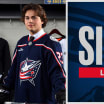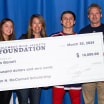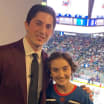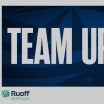Throughout John Haferman's life, the easiest way to get him to try to do something has been to tell him he can't.
He brought that attitude to the Columbus Recreation and Parks Department when he was hired full-time in 1989 with the goal of introducing sporting opportunities to any kid who walked through the doors.
Someone told him he couldn't get inner-city kids to golf, so he started there. In winter, he'd fill up a bus with youngsters and drive an hour to get them on the ski slopes.
But for someone who grew up in Canada and played club hockey at Central Michigan University, perhaps the most obvious thing in the world was to get kids on the ice.
Haferman has introduced thousands to hockey in Columbus
Columbus Ice Hockey Club co-founder is up for national award for his work building the sport
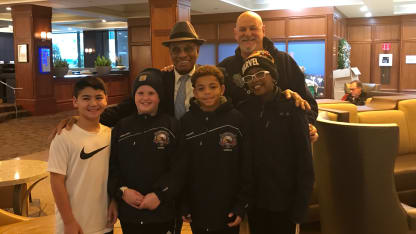
The end result is the Columbus Ice Hockey Club, a "Hockey is for Everyone" program in the capital city that has spent more than 20 years under Haferman's leadership encouraging anyone who wants to get on the ice to do so. It's also how Haferman has become one of three finalists for the
Willie O'Ree Community Hero Award
, an NHL honor that goes to one person each year who goes above and beyond to spread the sport and its ideals.
And it all started with a challenge.
"It was never a grand scheme that we would do it this way or we knew it was going to last this long," said Haferman, now director of hockey for the parks department. "It was literally somebody told me black kids couldn't play hockey, and I was like, 'Well, why not?'
"I've always shined my best when somebody told me I couldn't do something, or something couldn't be done. Usually, I'm the type that takes that and puts a chip on my shoulder and wants to prove somebody wrong."
Watch: Youtube Video
How wrong has he proved that original naysayer? The numbers are staggering.
Under Haferman's guidance since he co-founded the club with Jeff Christian in 1999, the Columbus Ice Hockey Club has helped introduce approximately 30,000 boys and girls from ages 5-18 from underserved neighborhoods in central Ohio to the game of hockey. On average, the programming for 3,000 youth through CIHC's Learn to Play Hockey, Learn to Skate, and hockey team programs are made up of more than 65 minority participants and more than 25 percent female.
Besides ice and street hockey, the CIHC provides programming for club participants in the areas of conditioning, academic support, violence prevention and community service. Under his leadership, the club has distributed more than $300,000 in scholarship funds, and more than $250,000 in free equipment from the program's equipment bank over the past 10 years has been given to individuals who could not afford to buy it.
Over 7,000 young women have come through Columbus Ice Hockey Club. Hear from Ebony, Essence, and Elijah Wyse what they like best about Coach John. https://t.co/kmP0SK27i5 @sportzkelz @BlackGirlHockey @CBJGivesBack @614Hockey @DonskovHD pic.twitter.com/PRvM0KZJvn
— Columbus Ice Hockey Club (@CIHockeyClub) July 21, 2020
Yet it's a comprehensive program that for more than two decades has stood for a lot more than just hockey.
"To me, this is just a recognition from a community for his sustained excellence and energy in this space," said Mike Watson, president of the Columbus Ice Hockey Club. "You talk about exposing kids, primarily African-American, from the city of Columbus to the sport of hockey, this is like a 20-year process for him. He's been very successful doing this, almost to the point that he's developed a best practice that other cities can learn from.
"What John has developed is really a playbook on how you expose individuals from diverse backgrounds and all backgrounds, how you not only expose them to hockey, but how do you make them fans? How do you help them use the game to achieve other goals that they have in life?
"That's the funny thing when I think about the Ice Hockey Club and what he's done, he's made it more than about hockey. It's not just about skating. It's not just about learning to play the game of hockey. It's the lessons that you get from it."
For Watson, Haferman's dedication has had a true impact in his family, as Watson's sons Spencer and Sam have progressed into the higher levels of junior hockey at Culver Military Academy and in the Ohio AAA Blue Jackets program, respectively.
Watson first met Haferman when he read a story in the Columbus Dispatch about the Columbus Ice Hockey Club and was looking for someone to help teach his Spencer and Sam the game. Spencer, the older son, had completed a learn to skate class but needed someone to help teaching him the game. Mike called the number for Haferman that was in the story, even if he now admits he wasn't fully in tune with the sport that would become so much a part of the Watsons' lives.
"To show you how little I knew about hockey, I actually let (Spencer) go out in a football jersey," Mike Watson says now with a laugh. "He had on a Troy Smith jersey. John is looking at all the kids and he's like, 'You need a hockey jersey.' I didn't know what a hockey jersey was.
"It's the funniest story, but when I met John, it was like he was this larger than life personality. What amazed me was there must have been 60 or 70 kids out there, and they all listened to them. They all had their eyes fixated on him, and it's almost like every kid, when they are in his presence, they look up to him. That's the type of presence that he had."
It's personal stories such as that which have helped build the club over its two decades, and the proof is in the results. The program has produced at least a Division I hockey player in Ayo Adeniye, two Thurgood Marshall Scholarship Fund scholarship winners through national Hockey is for Everyone efforts, and countless role models and community members who have helped create a family atmosphere and a home through the sport of hockey.
Very proud of this young man both on the ice as well as off! Hard work is paying off!#MakingCIHCProud @DonskovHD @AAABlueJackets @deangrillo @EustaceKing @Chuckgrillo1 @cbjcannon @CBJGivesBack pic.twitter.com/exmErvHJjK
— Columbus Ice Hockey Club (@CIHockeyClub) July 21, 2020
"John has fostered a true community in the program. Even after graduating from the program, many of us maintain our relationships with one another in our personal lives," said Cassidy Guthrie, who used one of the NHL/Thurgood Marshall College Fund academic scholarships to attend Miami University, where she played hockey.
"John strives to enlist the help of his participants in building the program. He has always been open to feedback, and quickly sees graduates of the program as sources of insight. The opportunities he has presented alumni since our graduation from the program has helped to develop us as working professionals with the aptitude to make positive contributions to the communities we engage with in our adult lives."
In many ways, Haferman is uniquely qualified for the job. Born in Lethbridge, Alberta, Haferman is the son of a Lutheran minister, while his mother was the president of the Children's Aid Society of Canada, and he said it wasn't unusual for his parents to be fostering close to 20 kids at a time while he was growing up. During his teenage years, he was tasked with watching five or six kids each afternoon, and one of the best ways to pass the time was to come up with games to play.
As a result, he was always raised to be a helper and always had kids at the forefront of his mind. He eventually moved to Michigan then came to Columbus in 1984 for a summer job with the Columbus Recreation and Parks Department and never left.
Through the parks department he taught and coached just about every sport -- when Haferman was working at Barnett Community Recreation Center, his programs featured such notable basketball players as Kenny Gregory, Samaki Walker and the Sullinger brothers as kids -- even though hockey is the one where Haferman's impact continues to be most felt.
A grant partner of the Columbus Blue Jackets Foundation, the Columbus Ice Hockey Club is one of around 40 that works as part of the NHL's Hockey is for Everyone initiative, and Haferman's actions have proved those aren't just empty words.
"Kids are absolutely amazing," he said. "A lot of kids can pick things up that you would sit there and say, 'No, no, this is too hard. They can't do it.' As adults, we want to limit kids, say, 'I know you can't do this,' rather than say, 'Well, let's just see what they can do.'
"My motto has always been that you meet amazing people every single day, so you don't ever discount anybody and judge people by the cover of the book. This is something that you have to let people have opportunities to try things. Anytime somebody says, 'No, they can't do something,' I like to prove people wrong."
A number of initiatives from the CIHC over the past couple of years have served to increase opportunities for those coming through the program, including development on and off the ice. An education partnership launched in 2019 with I Know I Can of Central Ohio helps assist placing CIHC members into college or careers, and in 2021, a new program will expose CIHC students in high school with shadowing an internship programs with assistance from partners in central Ohio.
On the ice, Haferman has expanded the reach of the CIHC into support of adaptive hockey. In the fall of 2019, a unique "Try Hockey For Free" clinic designed specifically for individuals with various physical and developmental impairments that prohibit them from playing hockey in the traditional sense was created and carried out. The program, which was offered to individuals of all ages who have visual impairments, led to the creation of a new hockey organization. Haferman is currently working on ways to improve the efficacy of the adaptive pucks that are embedded with a bell so players may follow the sound.
With that resume, it's no surprise that Haferman is up for the O'Ree Award. It would be extra special to Haferman to earn the honor considering his relationship with O'Ree, who has become one of the sport's most notable and respected ambassadors since breaking the NHL's color barrier in 1958.
"It would probably be the most rewarding thing that could ever happen in my pro career because it's just a little bit of validation of putting in all the long hours and everything else," he said. "Not that you strive to get that, but it certainly does feel like it's a pretty cool thing.
"To have an award named after the gentleman I think is the most inspirational to me in what I've tried to do would just be phenomenal."




